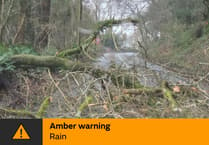THE National Society for the Prevention of Cruelty to Children (NSPCC) is demanding urgent action from tech giants as online grooming crimes in Devon and Cornwall almost doubled last year.
Devon & Cornwall Police recorded 211 sexual communication offences with a child in the last year in South West England, an increase of 95 per cent compared to the previous year.
UK-wide data shows how private messaging platforms are being used by criminals to manipulate and groom children.
It comes as new NSPCC research highlights a range of tools tech companies, Ofcom, and the Government can employ to protect children from perpetrators.
Nationally, of the 2,111 offences where police could identify the platform used, 40 per cent took place on Snapchat, nine per cent on WhatsApp and nine per cent on Facebook and Instagram.
And where gender was known, 80 per cent of children targeted were girls. Meanwhile, the youngest victim of online grooming recorded was a four-year-old boy.
The charity is highlighting that while these are the offences recorded by police, the real number of crimes is likely to be much higher due to abuse happening in private spaces where harms can be harder to detect.
To tackle this issue, the NSPCC is publishing new research setting out solutions which can be used to prevent, detect and disrupt grooming in private messaging spaces.
Online child sexual abuse crimes can have a long-term impact on a child, leaving them with feelings of guilt, shame, depression, confusion, anxiety and fear.
The charity’s new research identifies cycles of behaviours that perpetrators use, such as creating multiple different profiles and manipulating young users to engage with them across different platforms.
In response, the NSPCC is urging Ofcom and tech companies to take swift action on the recommendations set out in the report, so that they can better identify and prevent online grooming.
The recommendations include: implementing tools on a child’s phone that can scan for nude images and identify child sexual abuse material; using metadata analysis to spot suspicious patterns and creating barriers for adult profiles engaging children on social media platforms.
It also calls for tech platform leaders to commit to delivering services which effectively support and balance user safety and privacy.
The research shows that safety measures must be introduced at the same time to be effective, working in tandem to ensure harm is prevented across the grooming cycle.
The NSPCC is urging tech companies, Ofcom, and Government to take leadership on addressing this devastating crime and commit to using every tool available to them to stop perpetrators in their tracks.
Chris Sherwood, NSPCC Chief Executive, said: ‘It is deeply alarming that online grooming crimes have reached a record high across the UK, taking place on the very platforms children use every day.
‘At Childline, we hear first-hand how grooming can devastate young lives.
‘The trauma does not end when the messages stop, it can leave children battling anxiety, depression, and shame for years.
‘Tech companies must act now to prevent further escalation.
‘The tools the NSPCC sets out to protect children are ready to use and urgently needed.
‘Importantly, they mean that services can keep children safe while protecting all user’s privacy.
‘Children’s safety must be built into platform design from the start, not treated as an afterthought’.





Comments
This article has no comments yet. Be the first to leave a comment.